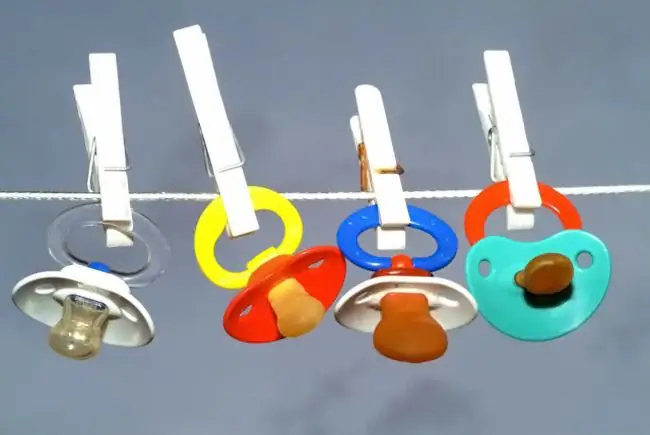- Author Arianna Cook cook@women-community.com.
- Public 2023-12-17 14:23.
- Last modified 2025-01-23 09:40.
Everything about pacifiers for newborn babies. Its pros and cons of using, as well as how to wean a child from a dummy, read in this article Someone considers a dummy to be a blessing, and someone categorically does not accept its use. Sometimes serious arguments flare up between parents about the dangers and benefits of pacifiers and how often they give it to the child?
What is a dummy?
Pacifiers are silicone or rubber nipples with a silicone or plastic base. If you choose latex nipples, despite their softness and elasticity, they can quickly become unusable. Modern pacifiers are very safe, they are easy to sterilize, and thanks to the plastic base, the child will not be able to swallow it or choke on it. It is very good if you purchase a pacifier with a plastic chain that can be easily attached to your baby's clothes. I know from personal experience that it will be much easier this way. After all, babies can simply throw out the pacifier, and since it is on a chain, this prevents it from falling to the floor.
How often are babies given a pacifier?
Many parents give pacifiers to babies in their second and third months. These are mainly those who had their first child. Of course, you shouldn't give your baby a pacifier unnecessarily, just like that. If you already use a pacifier, then give it as a means of calming, as you calm down, you can pick it up. If the baby has fallen asleep with a pacifier, then it is necessary to remove it with care.
Pros of using pacifiers:
- With it, falling asleep and calming the child becomes much easier.
- Sucking on pacifiers can help relieve stomach cramps.
- For premature babies, sucking on a pacifier can also help: when given before feeding, it will make it easier for these babies to transition from tube feeding to bottle feeding.
Recommendations for using a pacifier:
- Use only orthodontic pacifiers.
- Keep the pacifier clean and sterilize it regularly.
- Change the pacifier regularly and check for defects.
- Do not dip it in sweets so that the child does not develop caries.
- Give only when necessary to calm the baby.
- Weaning off the dummy if the child is not more than a year old, it will be much easier to do than at two or three years old.
Cons of using pacifiers:
- If the child is constantly with a dummy, then he may have problems with his teeth. According to pediatricians, long-term use can affect the growth and development of teeth, especially when permanent teeth are erupting.
- Speech problem. This can prevent your child from learning and mastering different sounds. If the parents give the baby a dummy for a long time, then he will later begin to learn to speak.
- If used regularly, it can interfere with continued breastfeeding. It has been proven that those mothers who gave a pacifier more often completed breastfeeding earlier than those mothers who did not use it at all, or, if they did, very little. The fact is that when the baby sucks on the nipple, and not the breast, then the mother's nipples are not sufficiently stimulated to produce the hormone prolactin, as a result of which milk becomes less and less. So frequent use of a pacifier can lead to interruptions in breastfeeding, especially in the first three months of life.
How to wean from a dummy?
- Reduce the time to suck on the pacifier.
- Give it just before bed.
- Encourage your baby to refuse to suck on a pacifier in every possible way: praise him, play with him, give toys, say that he is already so big.
- You can put the pacifier somewhere. You can offer the child to give all of his pacifiers to someone, you can make the nipple fall and someone "ate" it. Well, here, of course, you need to come up with something believable at your discretion, if the kid already understands almost everything.

Now you know all the benefits and harms of using pacifiers and can draw certain conclusions. In any case, its use should be in moderation so as not to harm the health of the baby.

